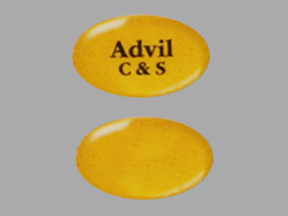
Advil Cold & Sinus Liqui-gels Coupons & Savings Card – Discount Prices from $9.18
My prescription
Edit
30-200MG, Advil Cold & Sinus Liqui-gels (32 Capsules)
Select pharmacy

Albertsons
$9.18
COUPON PRICE
Walgreens
$15.88
COUPON PRICE
Walmart
$30.08
COUPON PRICEAdvil Cold & Sinus Liqui-gels savings card
Show this card to your pharmacist
Albertsons
$9.18
BIN
ID
PCN
GRP
011867
LH195FF862
HT
LABH001
Powered by
Price history for Advil Cold & Sinus Liqui-gels
32 Capsules, 30-200MG
Average retail price for Advil Cold & Sinus Liqui-gels
Average SaveHealth price for Advil Cold & Sinus Liqui-gels
Our price history data is based on aggregated prescription data collected from participating pharmacies in America. Our prescription data updates daily to reflect the latest price changes. If you notice a missing data point, it means there wasn't sufficient data available to generate a monetary value for that date.
*Retail prices are based on pharmacy claims data, and may not be accurate when we don't have enough claims.
Advil Cold & Sinus Liqui-gels dosage forms
Dosage Quantity Price from Per unit 30-200MG 32 Capsules $11.12 $0.35
| Dosage | Quantity | Price from | Per unit |
|---|---|---|---|
| 30-200MG | 32 Capsules | $11.12 | $0.35 |
What are the side effects of Advil Cold and Sinus gels?
Advil Cold and Sinus gels may cause side effects such as nausea, vomiting, headache, dizziness, drowsiness, dry mouth, nervousness, or trouble sleeping. More serious side effects can include high blood pressure, fast or irregular heartbeat, severe dizziness, mental/mood changes, or signs of kidney problems. If any severe side effects occur, it is important to seek medical attention promptly. Always consult with a healthcare professional for personalized advice.
Why do I feel weird after taking Advil Cold and Sinus?
Feeling "weird" after taking Advil Cold and Sinus could be due to side effects from the medication. Common side effects include dizziness, nervousness, or restlessness. It's also possible to experience gastrointestinal issues like nausea or upset stomach. If the sensation persists or is concerning, it is advisable to consult a healthcare professional for further evaluation.
Does Advil cold and sinus affect kidneys?
Advil Cold and Sinus contains ibuprofen, which is a nonsteroidal anti-inflammatory drug (NSAID). NSAIDs can potentially affect kidney function, especially with long-term use or in individuals with pre-existing kidney conditions. It is important for individuals with kidney issues or those at risk to consult a healthcare professional before using this medication.
